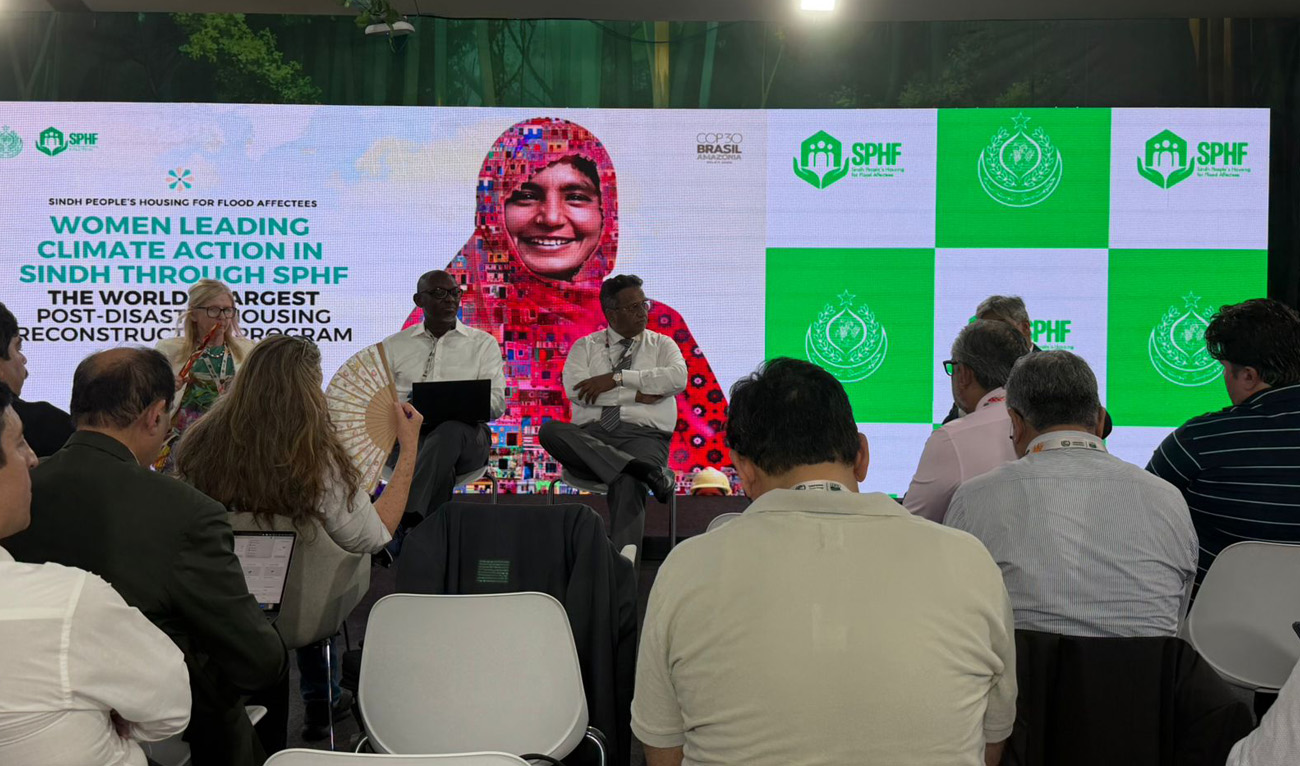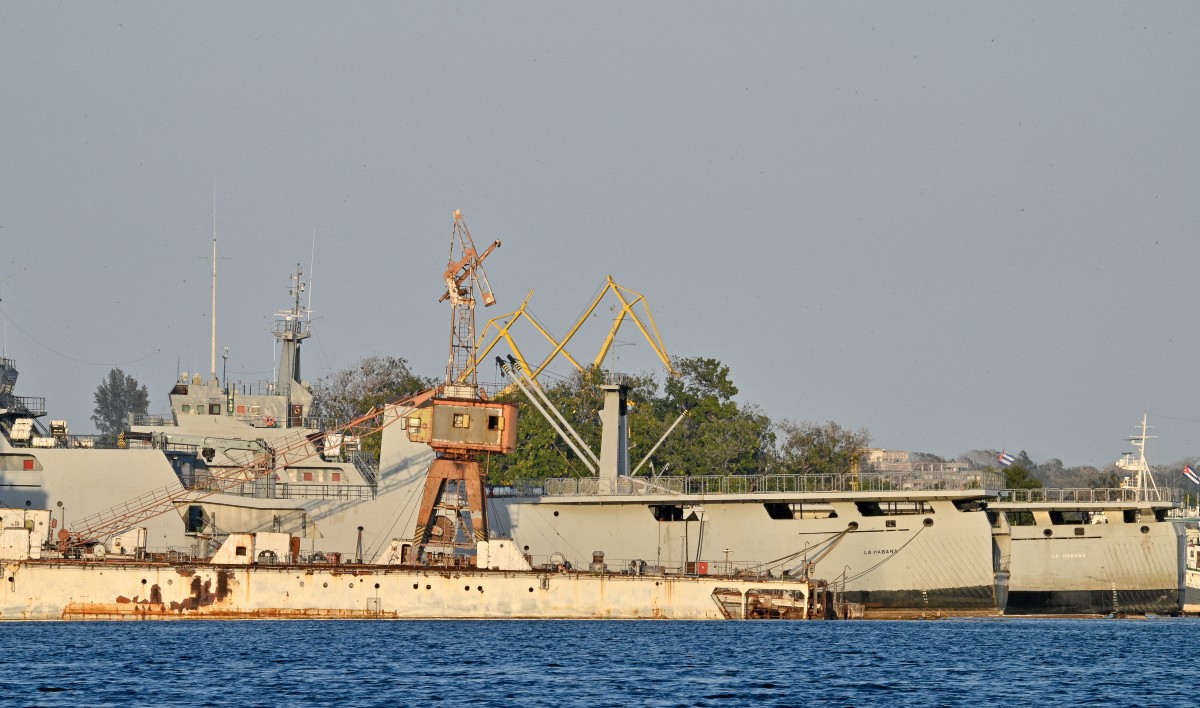At COP30, Pakistan’s Sindh unveils ambitious climate-resilient housing blueprint


Khalid Mehmood Shaikh, CEO Sindh People’s Housing for Flood Affectees (SPHF) programme, speaks during COP 30 in Belém on November 20, 2025. (Handout/SPHF)
ISLAMABAD: Pakistan’s southern Sindh province this week presented “the world’s largest climate-resilient housing reconstruction programme” at COP30 in Belém, showcasing the Sindh People’s Housing for Flood Affectees (SPHF) as a global model for gender-responsive climate recovery.
Launched in the aftermath of Pakistan’s devastating 2022 floods, which displaced more than 15 million people, SPHF aims to rebuild 2.1 million multi-hazard-resistant homes, directly benefiting more people than the populations of 154 countries, according to program leadership.
The 2022 floods devastated Sindh, affecting over 14.5 million people and causing the highest share of Pakistan’s national losses, according to official estimates by provincial disaster management authorities.
Up to 2.1 million houses were damaged or destroyed, hundreds of lives were lost, and more than 8,000 people injured. The floods also killed 1.2 million livestock, destroyed 3.6 million acres of cropland, and damaged over 13,000 kilometers of roads, disrupting livelihoods and food security.
Sindh bore the largest portion of Pakistan’s economic losses, highlighting the urgent need for climate-resilient reconstruction.
Speaking at the COP30 side event Women Leading Climate Action in Sindh through SPHF, Khalid Mehmood Shaikh, the program chief, emphasized the initiative’s unprecedented reach and people-centered design.
He said the program’s success was “rooted in strong political will and the engagement of the best private sector partners,” noting that transparency and digital monitoring were central to its implementation.
Shaikh explained that SPHF began with $500 million from the World Bank and Rs50 billion ($178.2 million) from the Government of Sindh, but the initial allocation was not enough to meet the massive reconstruction need.
“While the initial funding was not sufficient to construct 2.1 million houses, a robust system was established… Through these efforts, SPHF mobilized $2 billion to achieve the entire reconstruction target,” he said, citing additional financing from the Asian Development Bank (ADB), the Islamic Development Bank (IsDB), and further support from the World Bank.
Shaikh reported significant on-ground progress: “Under the SPHF program, we have opened 1.5 million bank accounts, 1.45 million houses are under construction, and completed 650,000 fully constructed houses.”
“A scale of climate-resilient recovery unmatched globally.”
He highlighted that 800,000 women are direct beneficiaries, with land titles for each house issued in women’s names, describing this as “the largest residential asset transfer in the history of Pakistan,” aimed at securing long-term resilience for “those most vulnerable to climate change, including women-headed households, widows, and elderly women.”
The program drew strong commendations from international development partners.
Noelle O’Brien, director of Climate Change at ADB, said, “SPHF demonstrates what true resilience in action looks like, placing women at the center of adaptation, finance, and governance.”
She added that this is “the kind of scalable, gender-responsive model the world needs,” emphasizing the importance of linking financial inclusion, resilient infrastructure, and community leadership to reduce long-term vulnerability.
Daouda Ben Oumar Ndiaye, manager of the Climate Change & Environment Division at IsDB, said the bank was “proud to support this initiative,” calling it a benchmark for global climate adaptation.
“IsDB’s focus on gender integration ensures women, widows, and the elderly are not only included but prioritized,” he said, adding that the bank is working to create synergies in Sindh through integrated health and women’s empowerment projects.
SPHF’s reconstruction efforts extend beyond housing.
A large-scale Water, Sanitation, and Hygiene (WASH) component valued at $600 million is underway to deliver clean water and sanitation facilities to 4,000 villages and 450,000 households.
Program leaders said the WASH initiative is essential for addressing vulnerability in communities repeatedly affected by climate-driven disasters.
Technology forms a central pillar of the program’s governance model. SPHF’s management system facilitates direct bank transfers, real-time progress monitoring, and digital verification to strengthen transparency, enable financial inclusion, and reduce leakages.
As governments and global institutions at COP30 explore pathways for equitable climate action, SPHF was presented as a replicable example of large-scale, gender-responsive climate recovery.
Its combination of public-private partnerships, digital transparency, and community empowerment was offered as a blueprint for climate-vulnerable nations seeking resilient and inclusive reconstruction models.
Latest News
Cuba kills four on US-registered speedboat trying to 'infiltrate'
2 HOURS AGO

Trump, Zelensky speak before Ukraine-US talks in Geneva
3 HOURS AGO

US presses missile issue as new Iran talks to open in Geneva
4 HOURS AGO

North Korea says willing to 'get along' with US if acknowledged as nuclear power
5 HOURS AGO
.jpg)
Modi says India stands 'firmly' with Israel post Gaza bombardment
7 HOURS AGO
.jpg)